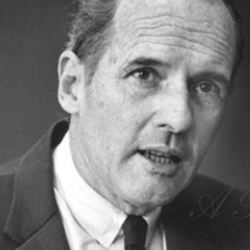
The prominent historian Carroll Quigley believed a secret elite of the most influential and powerful men exists in Britain and America and its goal is – with his words – to “create a world system of financial control in private hands able to dominate the political system of each country and the economy of the world as a whole“. According to Professor Quigley, every major event in history since World War One has been dominated by them.
Carroll Quigley was an American historian and theorist of the evolution of civilizations. He was a teacher at the prominent Jesuit controlled Georgetown University. One of his pupils was Bill Clinton. Clinton later named Quigley as an important influence on his aspirations and political philosophy. Quigley’s political view on history was of a conspiratorial character. In his 1300 pages history book, Tragedy and Hope from 1966. he wrote:
There does exist … an international Anglophile network … which we may identify as the Round Table Groups. I know of the operations of this network because I have studied it for twenty years and was permitted for two years, in the early 1960’s, to examine its papers and secret records.
Quote from Caroll Quigley’s Tragedy and Hope, Chapter 65
In his book The Anglo-American Establishment, he wrote:
The organization was so modified and so expanded by Milner after the eclipse of Stead in 1899, and especially after the death of Rhodes in 1902, that it took on quite a different organization and character, although it continued to pursue the same goals.
The Anglo-American Establishment
According to Quigley, it was Cecil John Rhodes who founded the group. In Rhodes own words the goal of The Group was this:
Why should we not form a secret society with but one object the furtherance of the British Empire and the bringing of the whole uncivilised world under British rule for the recovery of the United States for the making the Anglo-Saxon race but one Empire.
Cecil Rhodes, “Confession of Faith”, 1877

Cecil Rhodes was one of the richest and most influential and powerful men in the world at his time. He was a deep convicted racist and his plans were to create a global, white supremacy Empire:
I contend that we are the finest race in the world and that the more of the world we inhabit the better it is for the human race.
Cecil Rhodes, “Confession of Faith”, 1877
His plan for the global British-American Empire should:
…crush all disloyalty and every movement for the severance of our Empire. The Society should inspire and even own portions of the press for the press rules the mind of the people.
Cecil Rhodes, “Confession of Faith”, 1877
In other words Rhodes planned for a totalitarian global Empire, and that was exactly what also Caroll Quigley concluded by researching the Groups own secret documents. Quigley concluded:
The powers of financial capitalism had another far-reaching aim, nothing less than to create a world system of financial control in private hands able to dominate the political system of each country and the economy of the world as a whole. This system was to be controlled in a feudalist fashion by the central banks of the world acting in concert by secret agreements arrived at in frequent private meetings and conferences.
Quote from Caroll Quigley’s Tragedy and Hope, Chapter 65
Quigley said that he was not a member of this group but that he had:
…no aversion to it or to most of its aims and have, for much of my life, been close to it and to many of its instruments. I have objected … to a few of its policies … but in general my chief difference of opinion is that it wishes to remain unknown, and I believe its role in history is significant enough to be known.
Quote from Caroll Quigley’s Tragedy and Hope, Chapter 65
You can read a 10 page summary of Tragedy and Hope here
If you like you can also start reading the full version, the 1300 pages here
Watch the video “The Quigley Formula” by G. Edward Griffin
Read the full text of Cecil Rhodes: “Confession of Faith” from 1877
